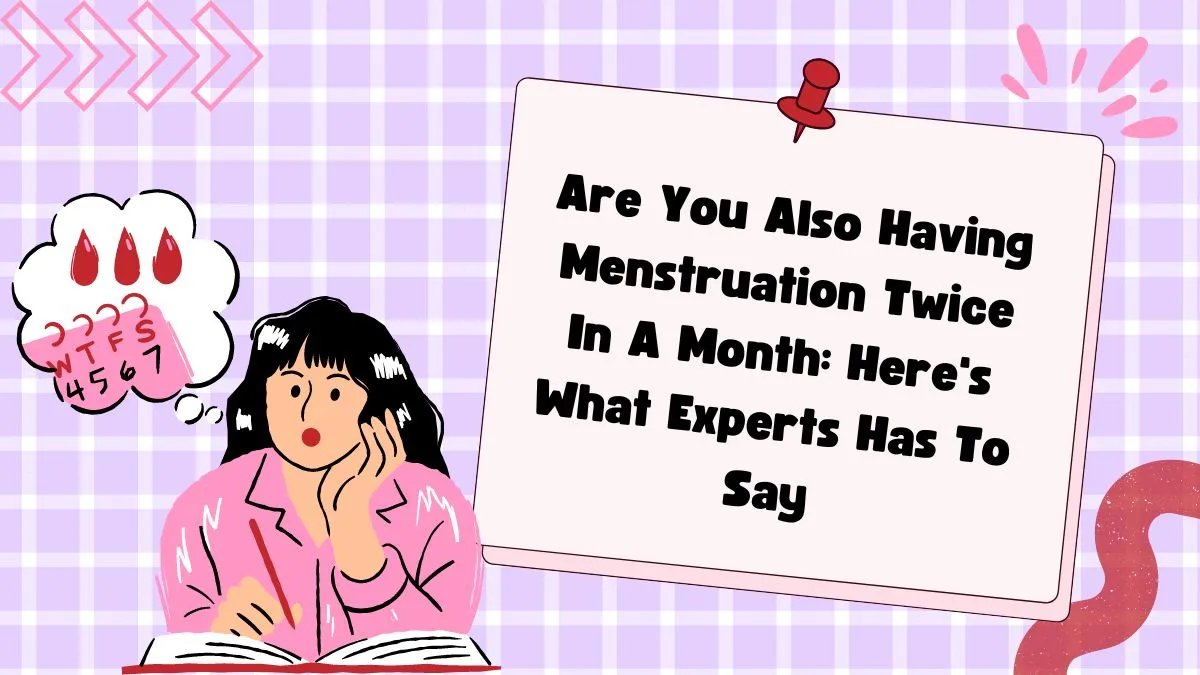- By Priyanka Munshi
- Thu, 30 May 2024 05:52 PM (IST)
- Source:JND
Polymenorrhea, or the occurrence of two menstrual cycles in a month, can be alarming and is often caused by various factors. Common reasons include hormonal imbalances (from thyroid problems or perimenopause), stress, dramatic weight changes, and the use of birth control or other medications. Moreover, it may indicate underlying medical conditions such as uterine fibroids or polycystic ovarian syndrome (PCOS).
While occasional menstrual cycle irregularities are acceptable, experiencing two periods in a single month frequently should be examined by a healthcare practitioner to determine the cause and ensure proper treatment, preserving overall reproductive health. In a conversation with Jagran English, Dr. Vinita Joshi, a gynecologist at Apollo Spectra in Pune, and Dr. Prasad Kulat, a consultant obstetrician and gynecologist at Ankura Hospital in Pune, discussed the reasons behind menstruation twice a month.
Ladies, do you also get your periods twice a month? Here are some possible reasons behind it: It is imperative to consult a doctor without delay and seek timely intervention. Imagine a scenario in which you have recently finished your menstrual cycle, only to find yourself experiencing another round of bleeding just 10 days later. This occurrence of having two menstrual cycles within a single month can lead to panic among women. But don’t be shocked, as it is possible to get periods twice a month. However, if it happens repeatedly, then it is a significant problem.
Also Read: Are E-Cigarettes Harmless? Doctor Reveals How It Affects The Body Internally
What Are The Factors Behind Menstruation Occurring Twice A Month?
“If a woman is of reproductive age, there is a high likelihood that she may experience bleeding if she is pregnant. Women who have polycystic ovary syndrome (PCOS) may experience two periods in one month due to hormonal imbalance. Hormones directly impact menstrual cycles, and some women with PCOS may not have a period at all. Weight gain associated with the disorder can also affect ovulation and result in bleeding irregularities. Fibroids can play a major role in getting menses twice a month. When polyps or fibroids form in the uterus lining, menstrual cycles will be disrupted. Thyroid malfunctioning in certain patients has been found to cause a significant disruption in hormone levels, resulting in the occurrence of two menstrual cycles per month. Oral contraceptive pills, or birth control pills, consist solely of hormones. If a woman fails to take them regularly, it can result in hormonal imbalance and potential bleeding,” said Dr. Vinita Joshi, a gynecologist at Apollo Spectra Pune.
Also Read: Top 10 Quotes To Overcome Overthinking Easily And Calm Down Your Mind
Dr. Joshi added, “If you have an infection in that area, it is possible that this bleeding is not related to your menstrual cycle. It could be a result of an unhealthy cervix or precancerous growth. Experiencing frequent bleeding could be a sign of perimenopause, which is normal for women over 40 years old. However, if the bleeding occurs frequently, it is advisable to visit a doctor. Stress leads to hormonal imbalances in young women due to their hectic work schedules. This can lead to having two periods in a month, which is considered normal if it happens occasionally. If the frequency increases, it is recommended to consult a doctor. Exceeding your body's limits during exercise can have consequences, such as experiencing two menstrual periods in one month. Engaging in intense workouts and extreme diets can negatively impact your reproductive health. It is important to gradually increase activity levels and maintain a balanced approach to allow your body to adjust. Excessive travel can lead to various factors affecting your hormonal balance, including changes in weather, eating habits, sleep patterns, and stress levels. These disruptions may result in two instances of bleeding within a single month. In addition to puberty, intrauterine contraceptive devices (IUCD), ovarian cysts, post-delivery, post-abortion, and endometriosis are a few more reasons.”
“The thyroid plays a crucial role in regulating hormone levels in the body. If there is an issue with your thyroid function, it could disrupt your menstrual cycle and cause you to have two periods within a month. Hyperthyroidism, which means an overactive thyroid, or hypothyroidism, where the thyroid is underactive, can both contribute to menstrual irregularities. Problems with the uterus itself can also result in frequent periods or irregular bleeding. Conditions such as fibroids or polyps may cause abnormal uterine bleeding that leads to more frequent menstruation. Additionally, inflammation of the uterine lining (endometritis) or endometriosis, a condition where tissue similar to that inside the uterus grows outside of it, can also cause multiple periods within a month,” concluded Dr. Prasad Kulat, consultant obstetrician and gynecologist, Ankura Hospital, Pune.

